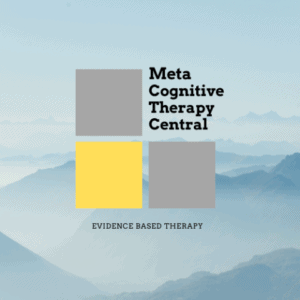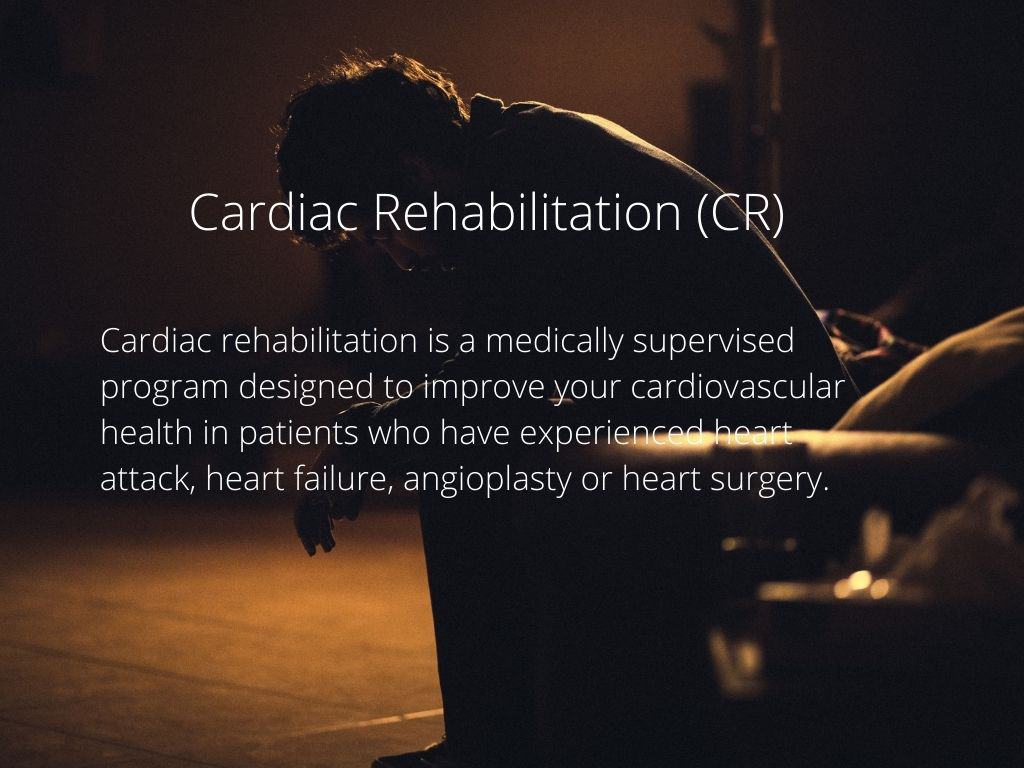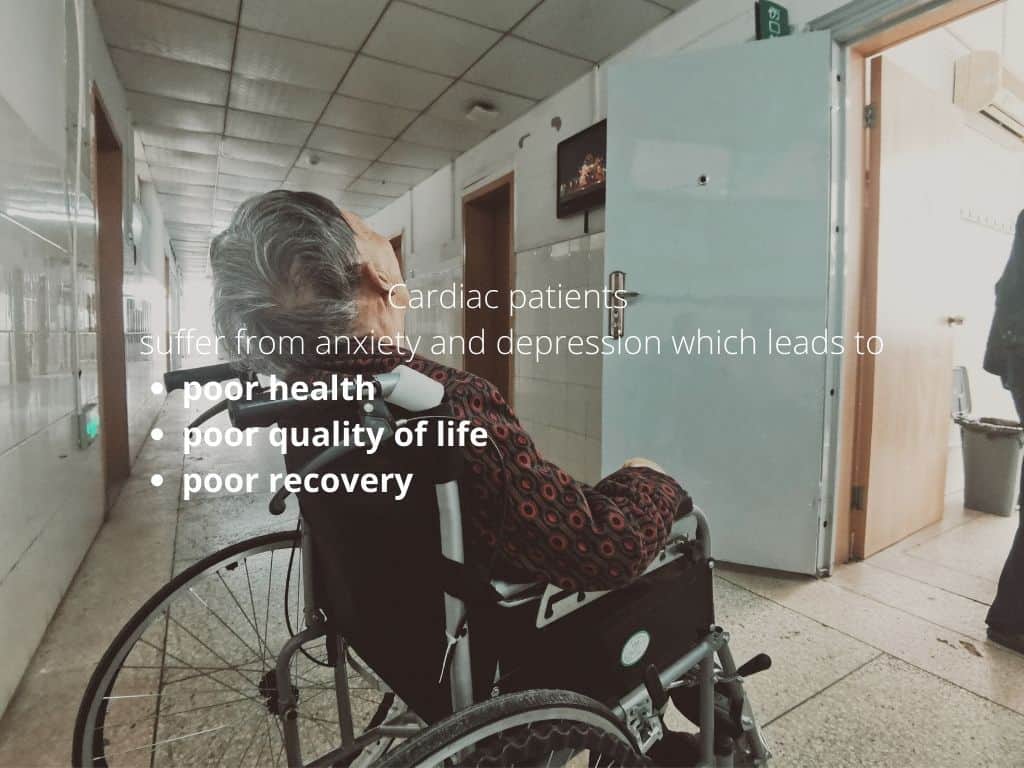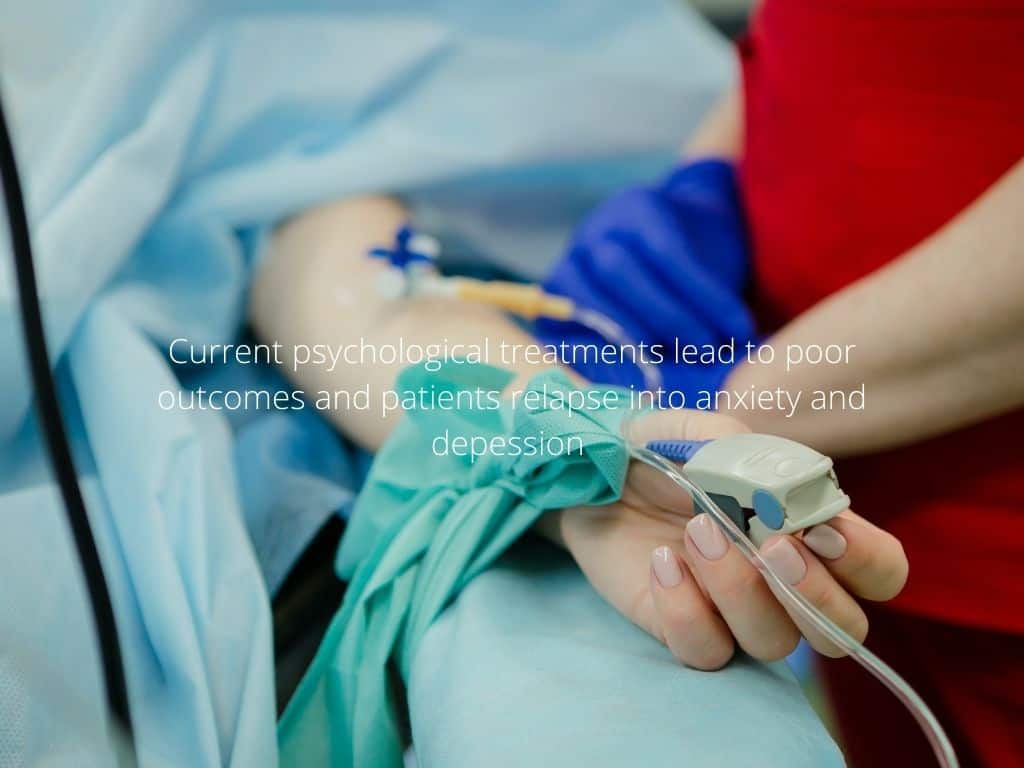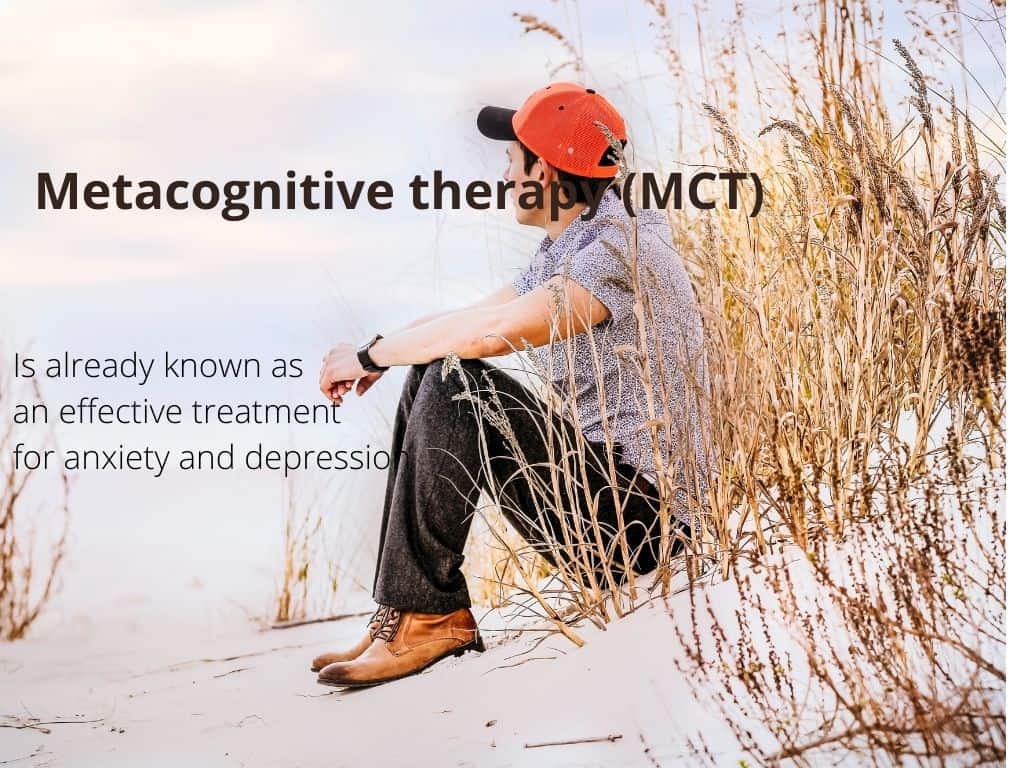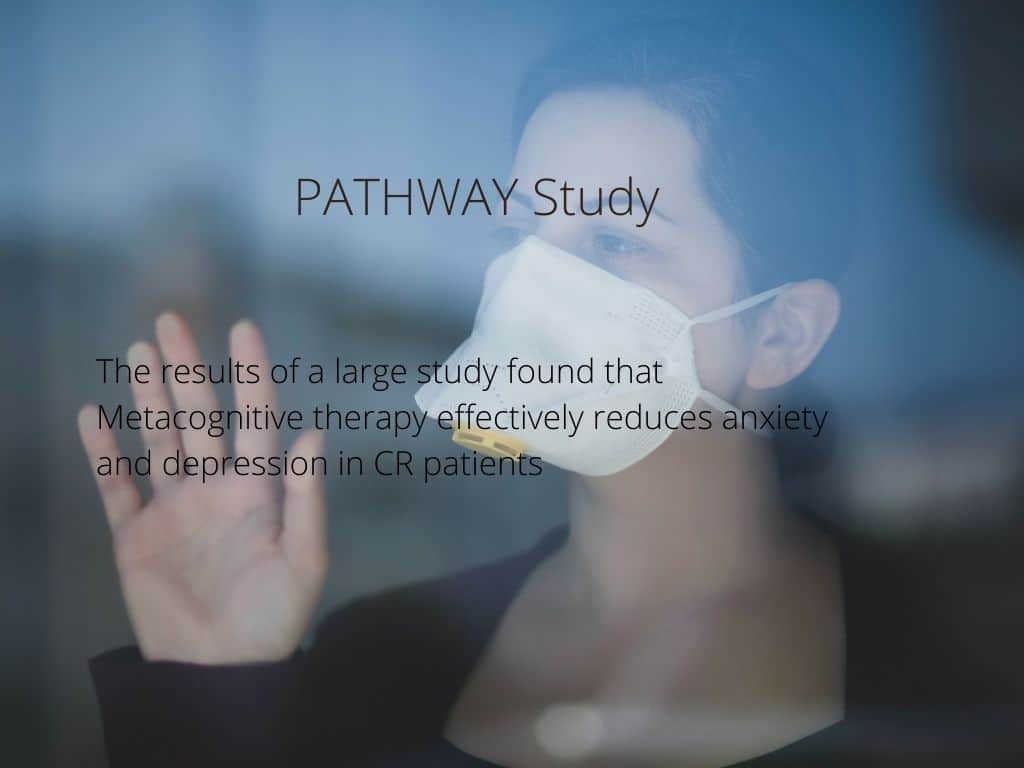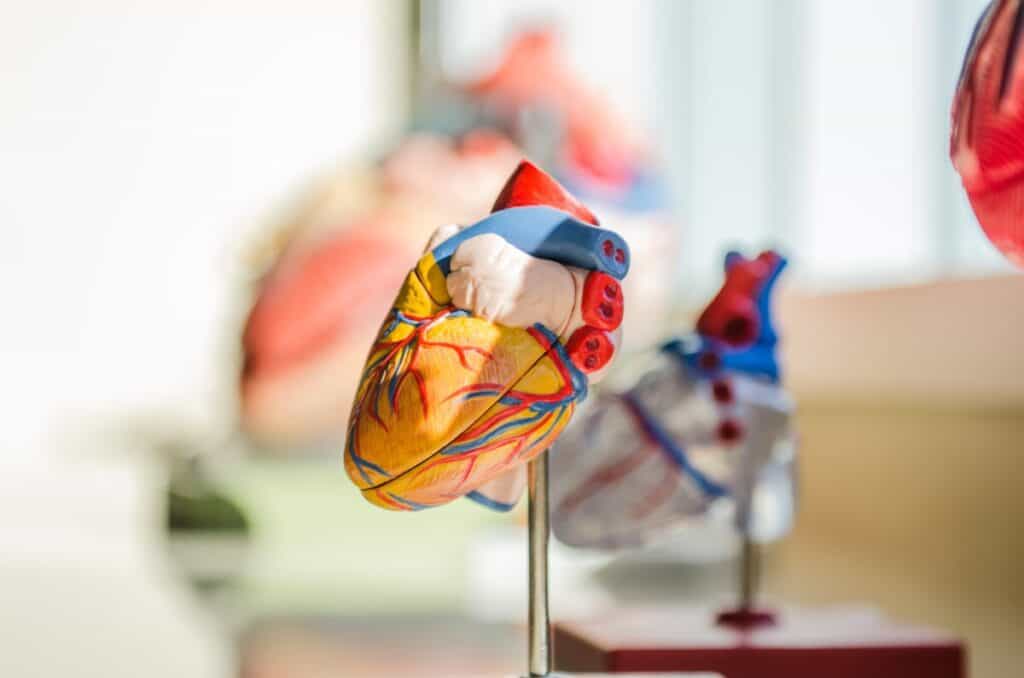
This article is based on a lecture on July 15th, 2021 presenting results from a PATHWAY study by Wells et al., 2021. The study tested if group-based and home-based Metacognitive therapy could reduce depression and anxiety in cardiac rehabilitation patients. The study was published in Circulation, American Heart Association Journal https://www.ahajournals.org/doi/10.1161/CIRCULATIONAHA.120.052428
Anxiety and depression in cardiac patients are associated with poorer health, poor quality of life, and poor prognosis. Current psychological treatments offer mixed and usually small improvements in these symptoms when patients undergo cardiac rehabilitation (CR). (1)
Group-MCT in routine cardiac rehabilitation appears to be safe and effective in reducing anxiety and depression in 1 in 3 patients with cardiovascular disease. MCT also improves trauma symptoms and reduces worry and rumination.
This study was the first time the effects of group Metacognitive therapy on anxiety and depressive symptoms were measured in cardiac rehabilitation patients (CR).
Why is psychological treatment important in heart disease patients?
Anxiety and depression are common in cardiac patients when they undergo cardiac rehabilitation (CR). 30% of CR patients suffer heavily from anxiety and depression.
According to the study, anxiety and depression in cardiac patients are associated with
- not complying with medical treatment
- more high-risk behaviors (e.g., smoking)
- increased risk of death
- increased risk of further cardiac events
- predicts future symptoms of psychological distress
- more hospital readmissions
- greater costs to the healthcare system
- lower quality of life
- poorer prognosis
These factors have gotten worse since the covid-19 pandemic. (1)
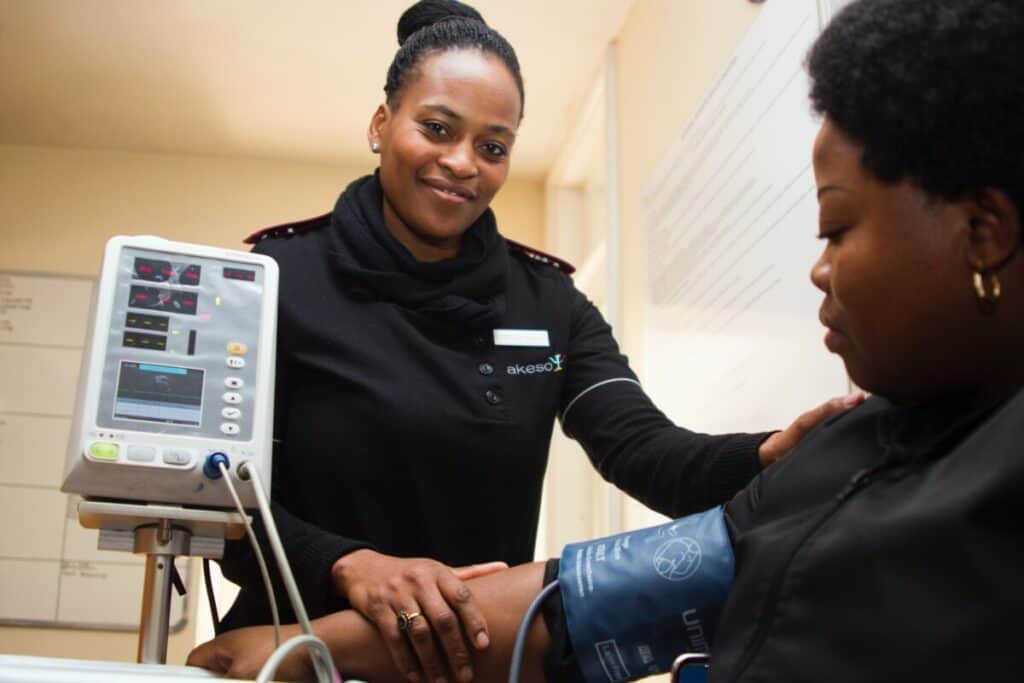
What is cardiac rehabilitation?
Cardiac rehabilitation in the United Kingdom is offered routinely as group sessions to patients after they have had a cardiac event (basically any incident that causes damage to the heart). Cardiac rehabilitation reduces mortality and hospital readmissions and improves the patients’ quality of life (2).
CR consists of exercise sessions, education, and stress management techniques to reduce the risk of cardiovascular disease and improve physical fitness and psychological functioning in patients (1).
How effective is current cardiac rehabilitation?
The impact of CR on anxiety and depression is small. Only 19% of CR group programs include psychological treatment in the UK, and only 2% of patients receive individual psychotherapy.
Besides, there are no standard or manual-based psychological interventions available yet for CR patients.
Approximately 47% of cardiac patients experience clinical levels of anxiety or depression at the start of CR, but only 12% move improve after completing the CR program (6% for anxiety and 6% for depression). In addition, there is evidence that this improvement is not maintained over time(2).
It seems that most CR patients continue to experience psychological distress. This is also supported by research on the effects of therapy for CR(3).
Given the nature of this problem and its huge impact, anxiety and depression must be managed effectively in CR programs.
The PATHWAY Study
The PATHWAY study is the first large-scale trial of group-MCT in patients with cardiovascular disease. (2)
The study evaluated if Metacognitive therapy improved depression and anxiety in cardiac rehabilitation patients.
Why use Metacognitive therapy for cardiac rehabilitation?
Metacognitive therapy (MCT) is a theory-based, structured treatment approach. According to MCT, unhelpful coping strategies like worry and rumination cause and maintain anxiety and depression.
MCT focuses on empowering patients to reduce worry and rumination, and other unhelpful behaviors, which research shows maintain anxiety and depression. This is achieved through worry postponement and by not engaging with negative thoughts.
MCT has proven highly effective for treating anxiety and depression in mental health patients. MCT also seems more effective than cognitive-behavioral therapy (CBT), which is one of the treatments offered in CR. To learn about the difference between MCT and CBT, read this post and this post.
One reason that CBT doesn’t work well enough in CR is because of the focus on negative thoughts. CBT challenges the evidence of negative thoughts and aims to exchange the patients’ negative thoughts with more realistic ones. However, in the case of CR patients, negative thoughts like, for example, future strokes are realistic and probable. Therefore, rationalizing negative thoughts might not be effective for CR patients(4). If you want to learn about the true nature of thoughts, read this post.
Besides, CBT does not address how much patients worry, when in fact, worry and rumination play a central role in maintaining anxiety and depression(4).
Metacognitive therapy does not focus on the content of patients’ worries, but works on reducing the time spent worrying and ruminating. Therefore, Metacognitive therapy seems well suited for cardiac rehabilitation. MCT is brief, structured, and effective in groups where patients have several diagnoses(2).
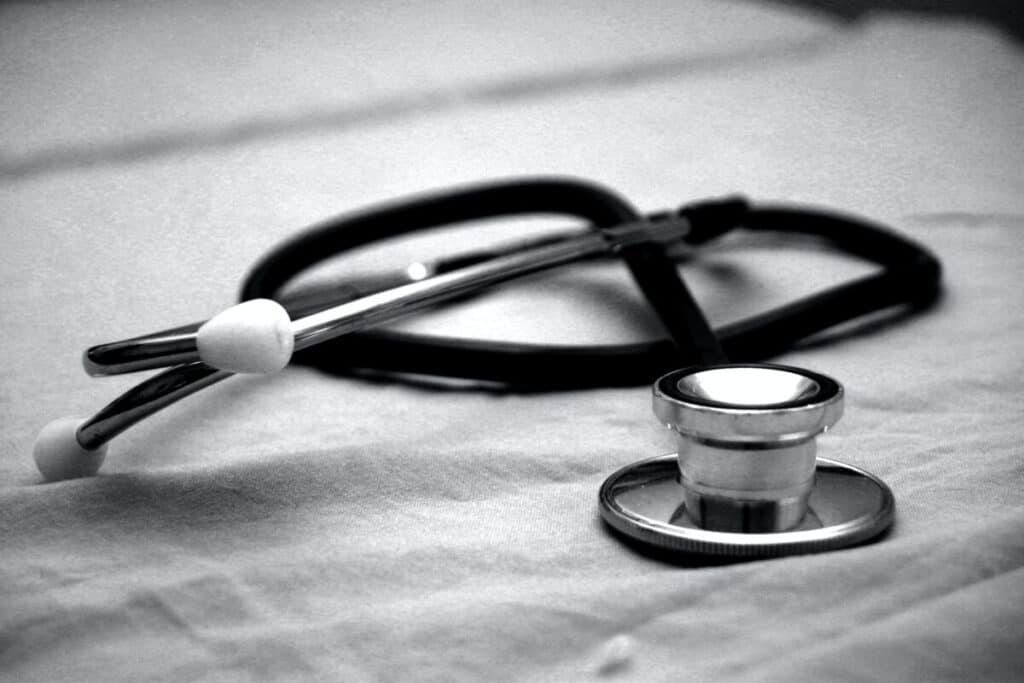
What did the PATHWAY Study Examine?
The PATHWAY study tested whether the addition of group-MCT to usual cardiac rehabilitation alleviates symptoms of anxiety and depression in patients with cardiovascular disease compared to cardiac rehabilitation alone.
The PATHWAY study was a 2-arm, single-blind randomized, controlled trial med 4- and 12-month follow-up. Controlled trials means that the effectiveness of a treatment can be tested because the treatment is compared with a placebo or control condition. Single-blind means that only the researchers know which type of treatment the participants in the study receive until the trial ends.
The study took place between 2015 and 2018.
Who participated
The types of patients included in the study had symptoms of anxiety and depression but didn’t necessarily have an official diagnosis of anxiety and depression.
The patients were recruited from five different hospitals in the UK to make sure that the results were generalizable(5).
Of the 332 patients who participated
163 (49.1%) were randomly chosen to MCT+CR
169 (50.9%) were chosen to CR alone
How did they test the effect?
Usual CR
CR programs are group-based programs, including group exercise sessions and educational seminars about stress management, cognitive behavioral therapy, and relaxation. They vary somewhat in content across services but run from 8-10 weeks.
Group-MCT Plus usual CR
Group-MCT consisted of helping participants identify triggering thoughts leading to the processes of worry, rumination, and other unhelpful coping behaviors. In addition, the patients learned specific techniques to reduce rumination and worry.
This group received group-MCT in addition to the usual CR (MCT+CR). Treatment consisted of weekly sessions over six weeks.
Through these techniques, the patients’ metacognitive beliefs about not controlling worry were weakened and changed to more realistic ones (e.g., I am in control of rumination and worry).
What did they find?
The trial demonstrated that six sessions of group-MCT significantly reduced overall depression and anxiety when added to cardiac rehabilitation compared with cardiac rehabilitation alone. The patients maintained this effect after 12 months.
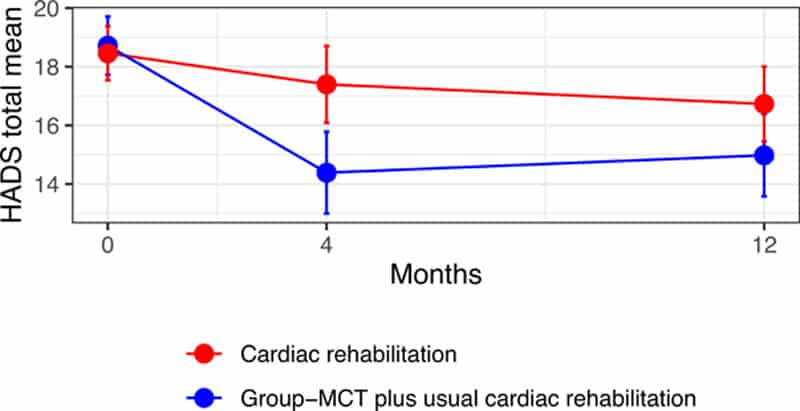
The results show that 21% in the CR group improved, compared with 33% in the MCT+CR group.
In the CR group, 15 % of the patients got worse than only 4% who got worse in the MCT+CR group.
The patients in the MCT+CR group also reduced their unhelpful metacognitive beliefs and repetitive and unhelpful coping styles.
| Patients receiving CR only | Patients receiving MCT+CR | |
| Improved from anxiety and depression | 21 % | 33 % |
| Got worse | 15 % | 4 % |
| Other changes | Reduced metacognitive beliefs Reduced unhelpful coping styles |
What do the findings mean?
Firstly, MCT lowers both anxiety and depression symptom severity. Secondly, MCT might also reduce the risk of psychological deterioration. Thirdly, the results at 12 months continued to show a superiority of the MCT group compared with treatment as usual, which means that the effects of MCT on anxiety and depression stay consistent in the long term. The benefits seem to be stable over a 12-month follow-up period.
Group-MCT in routine cardiac rehabilitation appears to be safe and effective in reducing anxiety and depression and improving psychological outcomes beyond those achieved in usual care.
Conclusion
The results from this large UK study suggest that combining Metacognitive therapy with cardiac rehabilitation reliably improves anxiety and depression for 1 in 3 in patients showing distress symptoms while cutting rates of deterioration in others.
The psychological benefits and reduced risks could be very important if MCT was offered to the 90 000 patients in the United Kingdom starting cardiac rehabilitation each year.
Group-MCT can significantly improve psychological outcomes in patients with cardiovascular disease and offer added value over standard cardiac rehabilitation.
Sources
- Adrian Wells, personal communication, PATHWAY study results event, July 15, 2021
- Wells et. al, Circulation Volume 144, Issue 1, 6 July 2021 https://doi.org/10.1161/CIRCULATIONAHA.120.052428
- Richards SH, Anderson L, Jenkinson CE, Whalley B, Rees K, Davies P, Bennett P, Liu Z, West R, Thompson DR, et al. Psychological interventions for coronary heart disease. Cochrane Database Syst Rev. 2017;4:CD002902. https://pubmed.ncbi.nlm.nih.gov/28452408/
- Normann & Morina, Front. Psychol., 14 November 2018 | https://doi.org/10.3389/fpsyg.2018.02211
- David Reeves, personal communication, PATHWAY study results event, July 15, 2021
